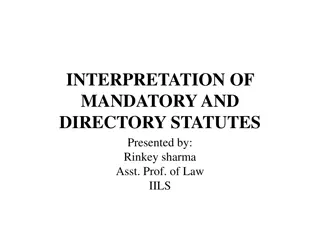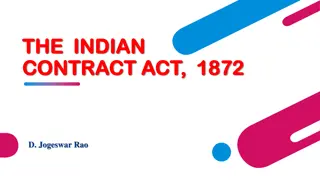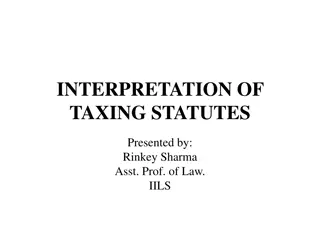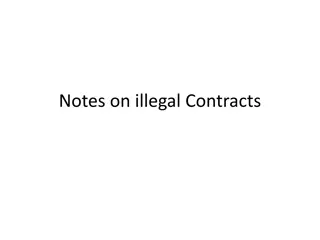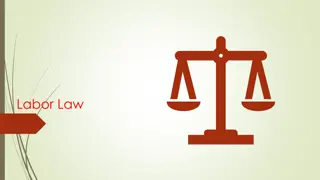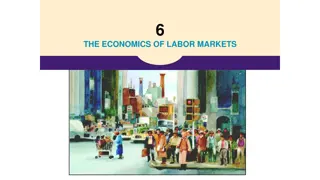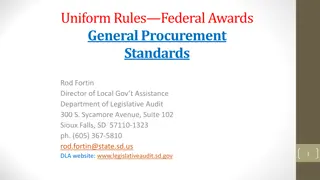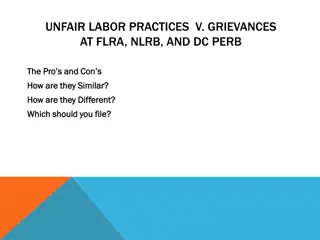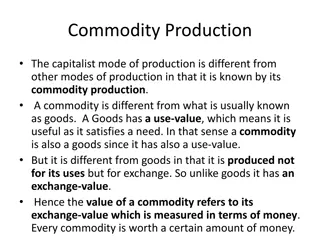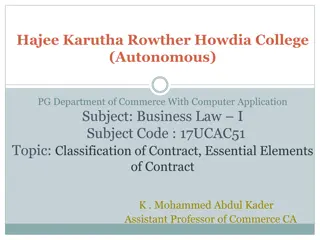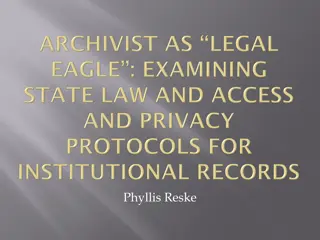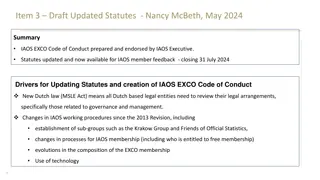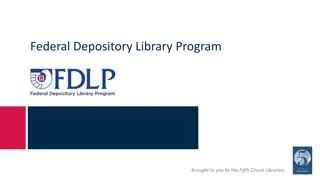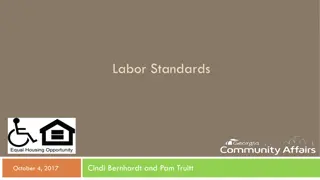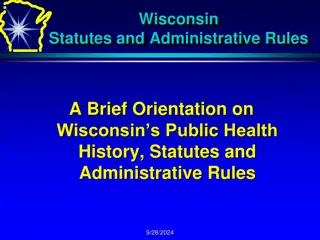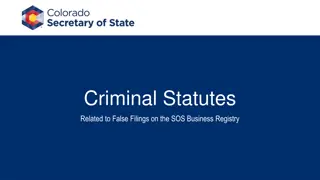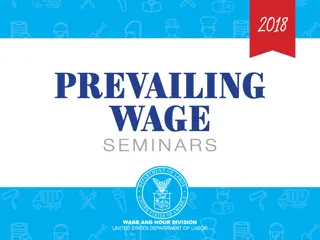Understanding Labor Standards Statutes on Federal Government Contracts
Explore the interaction of labor standards statutes like the SCA and DBA on federal government contracts. Learn about general principles, contracts requiring SCA or DBA, differences between SCA maintenance and DBA repair work, important considerations for DBA and SCA coverage, and specific guidelines for demolition and drilling work under these statutes.
Uploaded on Oct 07, 2024 | 0 Views
Download Presentation

Please find below an Image/Link to download the presentation.
The content on the website is provided AS IS for your information and personal use only. It may not be sold, licensed, or shared on other websites without obtaining consent from the author. Download presentation by click this link. If you encounter any issues during the download, it is possible that the publisher has removed the file from their server.
E N D
Presentation Transcript
Interaction of Labor Standards Statutes on Federal Government Contracts
SCA or DBA ? General Principles
Contracts Requiring SCA or DBA SCA does not apply to any contract principally for construction subject to the DBA Construction under the DBA includes construction, alteration, and repair, including painting and decorating
SCA Maintenance vs. DBA Repair SCA Maintenance Work is typically Scheduled, regular and recurring maintenance activities Routine to keep something in state of continuous utilization Examples: custodial service, routine HVAC filter changes, snow removal
DBA Repair Work Typically covers activities such as restoration of facility One time fix to something not functioning Restoration, alteration or replacement of fixed components Examples: building structural repair, renovation, roof shingling, paving repairs,
Important Considerations for DBA vs. SCA Coverage DBA-covered when activity part of construction contract Performed prior to acceptance by owner Examples of activities: Cleanup Landscaping Carpet laying Drapery installation
Important Considerations for SCA Coverage SCA-covered when activity is scheduled routine maintenance and upkeep Examples: Replace worn-out carpeting Janitorial work Mowing grass Replace draperies
DBA or SCA - Demolition Work (29 C.F.R. 4.116(b)) DBA-covered if subsequent construction is planned at the site or contemplated as part of future construction project SCA-covered if subsequent construction is not contemplated AAM # 190 provides further discussion
DBA or SCA - Drilling Work SCA-covered contract is for exploratory drilling: For a purpose other than construction To obtain data for use in engineering studies (29 C.F.R. 4.130(a)(16)) DBA-covered when drilling for holes e.g. water wells, oil wells, or other improvements (29 C.F.R. 5.2(i)) AAM # 55 provides discussion with examples
SCA Contracts with DBA Segments
Contracts Requiring SCA and DBA (29 C.F.R. 4.116(c)(2)) SCA and DBA both apply to contracts principally for services that: Contain specific requirements for substantial amounts of construction, alteration, or repair work Physically or functionally separate from other work called for by the contract
Contracts Requiring SCA and DBA (29 C.F.R. 4.116(c)(2)) SCA contracts that require substantial and segregable amounts of construction activity must include the DBA Substantial: the type and quantity of construction work, not merely dollar value Segregable: construction work is physically and functionally separate
Example: Contract for Food Services includes painting requirements Federal contract for furnishing food services includes requirements to paint cafeteria and kitchen: SCA-covered, as principally to provide food services through the use of service employees Construction activity (i.e., painting) is DBA-covered
Example: DOD Base Maintenance & Operation Contracts Are principally for services, but often require substantial and segregable construction work: Painting or repainting of base housing Refinishing floors Reroofing buildings If unclear whether SCA/DBA coverage applies to work element, contact contracting officer
SCA & DBA Contract Work Orders Questions can arise on whether work required by work order, task order, or service call is: SCA maintenance or DBA painting/repairs DFARS provides guidance when distinction is unclear Individual task or work orders are not to be split to avoid DBA coverage
SCA & DBA Contract Work Orders DOD guidance (DFARS 48 C.F.R. 222.402-70(d)(1)&(2) If distinction between SCA maintenance & DBA repair (other than painting) is unclear: SCA if service call or order will require less than 32 work hours DBA if 32 or more work hours
SCA & DBA Contract Work Orders DOD guidance (DFARS 48 C.F.R. 222.402-70(d)(3) If distinction between SCA maintenance & DBA painting unclear: DBA if 200 square feet or more of painting work is to be performed under a service call or task order Regardless of total work hours
Distinguishing PCA and SCA PCA covers federal contracts in excess of $15,000 for manufacture or furnishing of materials, supplies, articles, or equipment. SCA covers federal contracts in excess of $2,500 the principle purpose of which is to furnish services in the U.S. through the use of service employees
Distinguishing PCA and SCA (Contd.) Exempt from SCA is any work required to be done in accordance with provisions of the PCA. 29 C.F.R. 4.117(a) Exemption applies to work rather than contract subject to the PCA Purpose of exemption is to eliminate possible overlap of SCA and PCA labor standards
Distinguishing PCA and SCA (Contd.) PCA covers major equipment overhaul/ modification work, i.e., remanufacturing when equipment, item or material is: Completely or substantially torn down Totally rebuilt Manufacturing process utilized In facility owned or operated by the contractor
Distinguishing PCA and SCA (Contd.) SCA covers contracts for: Periodic and routine maintenance Servicing of equipment to keep it in usable, serviceable, and working order, or To repair damaged equipment not requiring a complete teardown Contracts typically billed on hourly rate labor plus materials and parts - basis
DBA Contract Requirements on PCA Contracts If a PCA contract involves a substantial amount of construction work on a public building or work (exceeding the monetary threshold for DBA application), it is also subject to the DBA if the construction work is physically or functionally separate from, and is capable of being segregated from, the other work required by the contract The word substantial relates to the type and quantity of work to be performed and not merely to the total value of construction work as compared to the total value of the contract. See FAR 48 CFR 22.402(b)
PCA and DBA Contracts - Examples Contract for the supply and installation of a security system that requires: Replacement of existing conduit; Laying cable; and/or Tearing out and replacing of walls
PCA and DBA Contracts - Examples Contract for the supply and installation of modular furniture or energy efficient lighting fixtures that requires: Bolting furniture or fixtures to floors, walls, and/or ceilings; Modifying walls, floors, and/or ceilings to accommodate shelving; Installing electrical connections for desk area outlets; and/or Installing new ballasts and/or lighting fixtures
PCA and DBA Contracts - Examples Contracts that provide for the supply and installation of equipment that requires construction activity such as: Reconfiguration or alteration of building space; Upgrade to utilities; and/or Bolting or affixing equipment to floors, walls, ceilings, etc.
Coverage Determination SCA/DBA/PCA Contracting agency has initial responsibility for determining coverage DOL has authority for final determination on coverage Final rulings may be appealed to the Administrative Review Board (ARB)
Disclaimer This presentation is intended as general information only and does not carry the force of legal opinion. The Department of Labor is providing this information as a public service. This information and related materials are presented to give the public access to information on Department of Labor programs. You should be aware that, while we try to keep the information timely and accurate, there will often be a delay between official publications of the materials and the modification of these pages. Therefore, we make no express or implied guarantees. The Federal Register and the Code of Federal Regulations remain the official source for regulatory information published by the Department of Labor. We will make every effort to keep this information current and to correct errors brought to our attention


